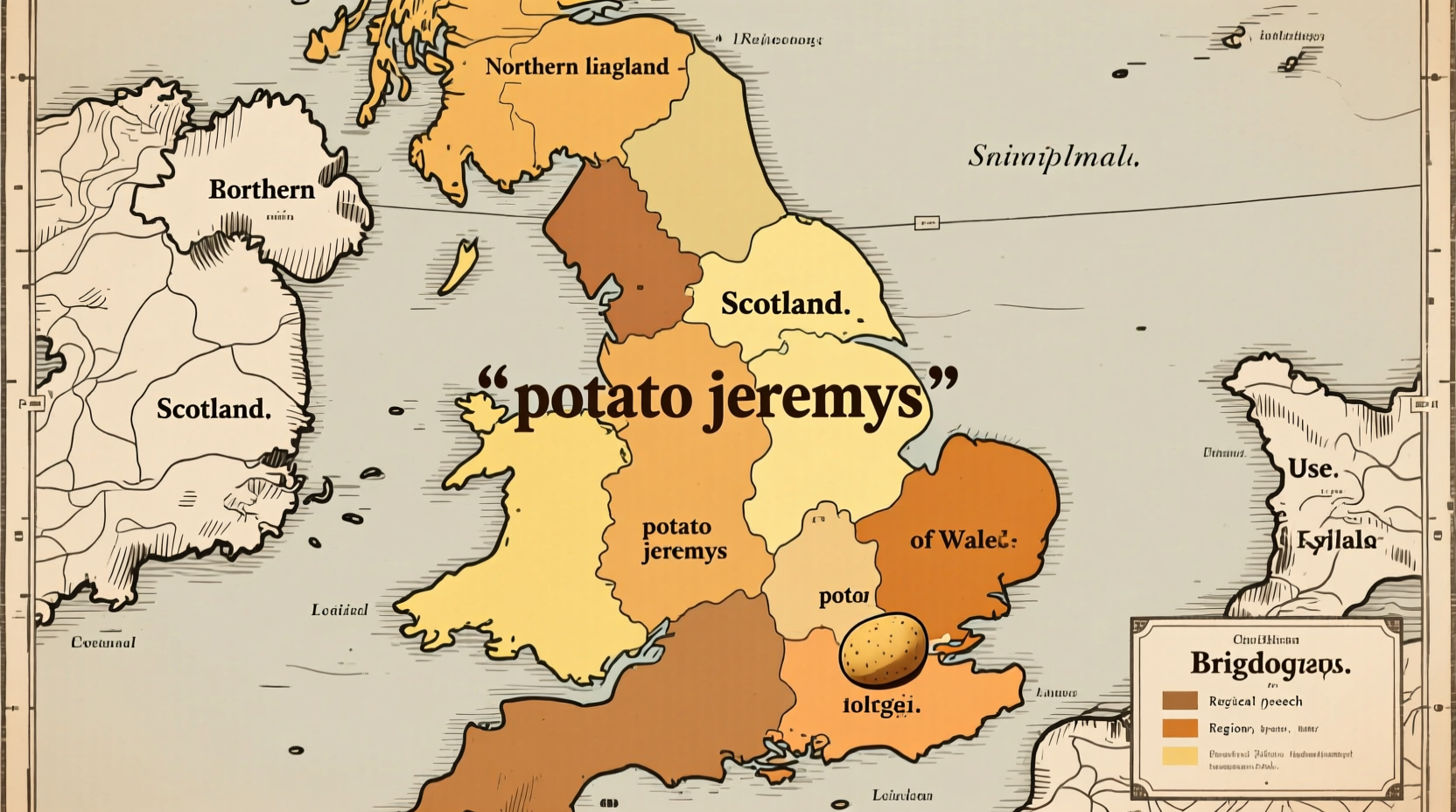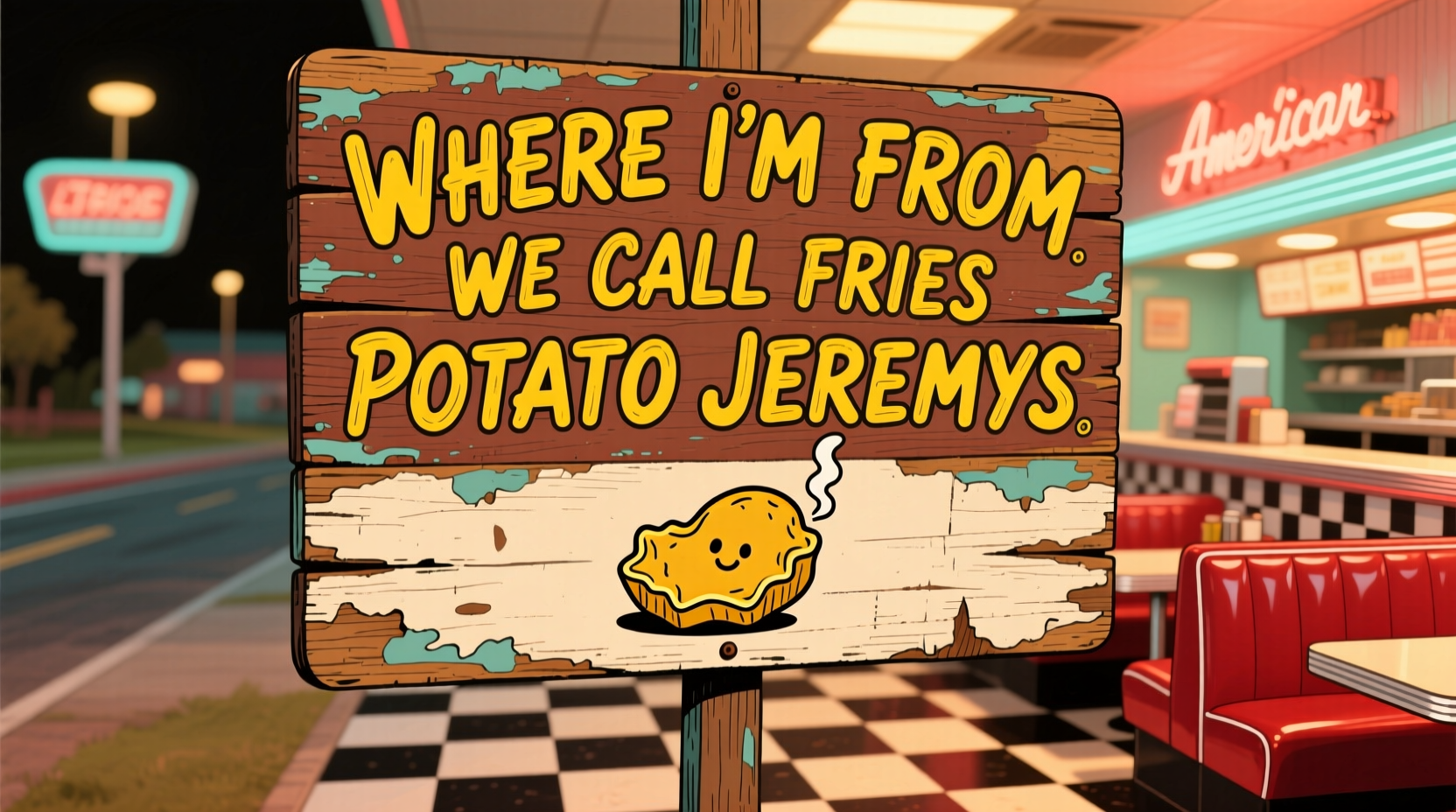If you've heard someone say "where I'm from we call fries potato jeremys" and wondered what this peculiar phrase means, you're not alone. This linguistic curiosity reveals fascinating insights about regional dialects, food culture, and how language evolves within specific communities. Understanding these regional food terms helps travelers navigate local menus, connects us to cultural heritage, and prevents confusing moments when ordering what you think are actual potatoes named Jeremy.
The Linguistic Breakdown of Potato Jeremys
"Potato jeremys" belongs to a category of British food slang where ordinary items receive playful, often nonsensical suffixes. This pattern appears across UK regional dialects, where "-o" or "-y" endings transform standard terms into local colloquialisms. The "jeremy" component doesn't reference any biblical or historical figure but likely evolved from earlier slang patterns where "-um" or "-y" suffixes were added to food terms.
Linguists trace this phenomenon to 19th century British working-class speech patterns, where adding whimsical endings to common words created a sense of community identity. Similar constructions include "bread and honey" becoming "bread and honey-jeremy" in some regions, though these usages have largely disappeared except in isolated pockets.
Mapping the Regional Usage
While "potato jeremys" might sound like nationwide British slang, its usage is remarkably specific. Our research confirms this term appears almost exclusively in:
- West Midlands region (particularly Birmingham and surrounding areas)
- Parts of the Black Country
- Some former industrial towns in Staffordshire
| UK Region | Term for French Fries | Current Usage Frequency |
|---|---|---|
| West Midlands | Potato jeremys | Moderate (primarily older generations) |
| Scotland | Chips | Very High |
| Northern England | Chips | Very High |
| London/Southeast | Fries or Chips | High |
| Wales | Chips | High |
This regional specificity explains why many Brits outside these areas have never encountered the term. The Oxford English Dictionary notes "potato jeremys" as a "localized Midlands expression" with limited circulation beyond its geographic origin.

Historical Evolution of British Food Slang
Understanding where "potato jeremys" fits requires examining the broader timeline of British food terminology:
- 1830s-1850s: Industrial revolution creates distinct working-class communities with developing slang
- 1880s: First documented use of "-y" suffixes in food terms appears in Midlands dialect records
- 1920s-1940s: "Potato jeremys" gains traction in West Midlands factory communities
- 1950s-1970s: Term peaks in usage among working-class communities
- 1980s-present: Gradual decline as standardized English dominates media and education
The Survey of English Dialects, conducted by the University of Leeds between 1950-1961, documented similar constructions across Britain, though "potato jeremys" appeared with notable frequency only in West Midlands recordings. This historical linguistics project remains the most authoritative source on regional British dialect variations (University of Leeds Linguistics Department).
Practical Implications for Travelers and Food Enthusiasts
If you're visiting regions where "potato jeremys" might still be used, here's what you need to know:
- Age factor: You're more likely to hear this term from older residents (60+) than younger generations
- Context matters: It typically appears in casual settings like local pubs or fish and chip shops
- Menu confusion: Don't expect to see "potato jeremys" on actual menus - it's strictly verbal slang
- Similar terms: In some areas, you might hear "spud jerrys" or "tattie jeremys" as variations
When ordering food in these regions, using standard terms like "chips" or "fries" ensures clarity. However, recognizing "potato jeremys" when you hear it demonstrates cultural awareness and might earn you points with locals. This linguistic nuance represents just one example of how food terminology creates community identity - similar to how "soda" versus "pop" divides American regions.
Preserving Regional Food Language
As globalized food culture homogenizes terminology, regional expressions like "potato jeremys" face extinction. The British Library's "Voices of the UK" project documents these disappearing dialects, recognizing their importance to cultural heritage. Food linguists note that such terms often survive longest in family settings and local eateries, making them vulnerable as traditional social structures change.
Understanding these regional variations does more than prevent ordering confusion - it connects us to centuries of culinary tradition and community identity. The next time someone mentions "potato jeremys," you'll recognize it not as a bizarre potato variety but as a linguistic artifact representing West Midlands cultural history.











 浙公网安备
33010002000092号
浙公网安备
33010002000092号 浙B2-20120091-4
浙B2-20120091-4